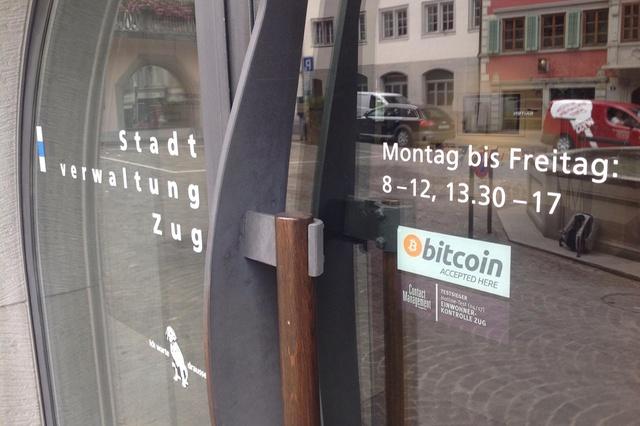Switzerland takes on challenge of gentrifying crypto

“Crypto Nation” Switzerland is attracting global attention with a set of legal reforms and a regulatory license to trade on the blockchain.
Blockchains are digital systems that store and transmit cryptocurrencies. The technology has been hailed in some quarters as an improvement on the current financial plumbing.
Switzerland has this year updated a range of company and financial laws to give blockchain commerce a solid legal basis. The financial supervisor has in the last two years licensed two crypto banks, a crypto stock exchange and Switzerland’s first crypto assets fund.
The intention is to replace the old “wild west” image by gentrifying cryptocurrencies. Raucous troublemakers like bitcoin are being scrubbed up and made fit for consumption by banks.

More
Explained: The technology behind bitcoin and blockchain
“The market has matured, the legal framework is there, licenses are being handed out, a pipeline of new financial products are being created,” says Katie Richards, former head of Falcon private bank’s crypto unit. She is now setting up the Swiss offices of Netherlands-based cryptocurrency investment company Cyber Capital.
“Switzerland is becoming more innovative and competitive. We are continuously attracting new companies from other countries.”
The first crypto companies started appearing in Switzerland around 2013 but the industry did not really take hold until the explosion in bitcoin prices four years later.
Switzerland already has non-profit foundations to house hundreds of millions of dollars crowdfunded by blockchain projects. It has converted military alpine bunkers into cryptocurrency storage centres. Now it wants to join the dots between the mysterious world of blockchain and conventional business.
Such legal and regulatory certainty is like gold dust to an upstart blockchain industry, which is viewed with grave suspicion in many parts of the world. Not least the United States where the financial regulator is coming down hard on some crypto players.
Last safe haven
British-Iranian citizen Amir Taaki has recently chosen Switzerland as a base for his DarkFi decentralised finance project. He is no fan of state interference, but views Switzerland’s regulatory stance as far more favourable than proposed cryptocurrency laws being formulated in the United States and the European Union.
“Governments are waging a war against cash, society and the economy,” he said. “China is becoming a role model for Western states. Switzerland is the last safe haven.”
Taaki refers to China’s strict controls on commerce and finance and increasing state surveillance of citizens.

More
Podcast: Decrypting cryptocurrency and blockchain
Facebook’s controversial cryptocurrency Diem also thought Switzerland would be an ideal base, only to be hauled back to the US so the authorities there could keep a closer eye on the disruptive project.
Blockchain finance companies like Fireblocks in the US and the Netherlands-based AllianceBlock are now springboarding into Switzerland. Deutsche Börse, which runs the Frankfurt stock exchange, has taken a controlling stake in Swiss regulated brokerage Crypto Finance.
Part of the reason is that knowing what you are allowed to do – and what you are not – offers a solid foundation for building a business. This also applies to tokenisation – the process of creating blockchain-compliant securities, like company shares, and ownership rights for art and collectibles. Cryptocurrencies are now just one part of a larger universe of “digital assets” that are created and traded on blockchains.
For example, the Swiss licensed crypto bank Sygnum has tokenised shares in a Picasso painting. Sygnum is one of a growing number of Swiss tokenisation platforms that have sprung up in the wake of legal reforms. They also allow companies to issue digital shares.
But the blockchain industry’s new growth spurt must be put into perspective. Spreading from its original stronghold in the central canton of Zug (known as Crypto Valley), the sector now boasts nearly 1,000 companies employing 5,000 workers across German, French and Italian speaking parts of the country.
The traditional financial sector employs 220,000 people in Switzerland. The country’s largest bank, UBS, has more than 70,000 staff worldwide. Bitcoin Suisse, among the oldest Swiss crypto companies, increased headcount from 120 to 260 over the last 18 months.
Suspicions remain
A handful of banks have started to dabble in cryptocurrency services, but the financial industry is still largely wary of cryptocurrencies. Banks worry about running into money laundering troubles. That’s why many crypto start-ups still struggle to get a bank account in Switzerland.
On the other side of the coin, supporters of decentralisation object to growing regulatory interference. Putting bitcoin in a suit and tie may make it look more palatable, but it also undermines its fundamental qualities, they argue.
Rather than being squeezed into the conventional infrastructure, cryptocurrencies and blockchain are supposed to replace banks and rigid rules with a nimbler technology that hands operational control to the masses.
On the face of it, Switzerland might not seem the most obvious place to employ a bank killer strategy. But Amir Taaki believes both worlds can co-exist in the Alpine nation, albeit uneasily.
“The crypto world will bifurcate into a heavily regulated domain, with no innovation, and decentralised finance, which will remain underground. They will probably not interact with each other.”

In compliance with the JTI standards
More: SWI swissinfo.ch certified by the Journalism Trust Initiative















You can find an overview of ongoing debates with our journalists here . Please join us!
If you want to start a conversation about a topic raised in this article or want to report factual errors, email us at english@swissinfo.ch.